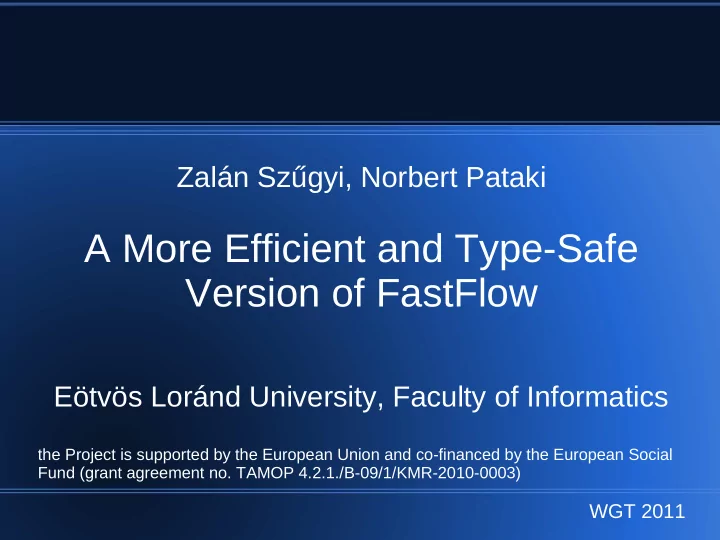

Zalán Szűgyi, Norbert Pataki A More Efficient and Type-Safe Version of FastFlow Eötvös Loránd University, Faculty of Informatics the Project is supported by the European Union and co-financed by the European Social Fund (grant agreement no. TAMOP 4.2.1./B-09/1/KMR-2010-0003) WGT 2011
Outline ● Introduction to FastFlow ● Type-safety problems of FastFlow ● Solution proposal, CRTP ● Implementation details – Buffers – Farm – Pipeline ● Example, and conclusion
FastFlow ● Parallel programming framework for multi-core platforms ● Based on non-blocking lock-free / fence-free synchronization ● Composed stack of layers: – ease of programming – fast and scalable ● Targeted to streaming application
Layers of FastFlow Figure is downloaded from the home-page of FastFlow: http://calvados.di.unipi.it/dokuwiki/doku.php?id=ffnamespace:about
Farm schemes Figures are downloaded from the home-page of FastFlow: http://calvados.di.unipi.it/dokuwiki/doku.php?id=ffnamespace:about
Pipeline schemes Figures are downloaded from the home-page of FastFlow: http://calvados.di.unipi.it/dokuwiki/doku.php?id=ffnamespace:about
Composition of schemes Figures are downloaded from the home-page of FastFlow: http://calvados.di.unipi.it/dokuwiki/doku.php?id=ffnamespace:about
Example
Creation of the farm
Structure of FastFlow ● The base class is ff_node ● In ff_node: virtual void* svc(void* task) = 0; ● svc is overridden ● while task is void* → svc is able to capture arbitrary argument in any type
Problem ● void* is needed to cast to a proper type by the programmer → safety deficiency struct Emitter : ff_node { void* svc(void*) struct Worker : ff_node { { int* t = new int(ntask); void* svc(void* task) /* ... */ { return t; double* d = (double*)task; } /* ... */ } std::cout << *d; //!!! return d; } }
Why is it void* ● FastFlow is designed by OO Paradigm ● Based on dynamic polymorphism ● svc is virtual function ● svc needs to handle any type of input data ● Function template cannot virtual
Solution proposal ● Apply static polymorphism instead of dynamic polymorphism. – proper function is chosen in compile-time ● improve efficiency – no virtual method table – no virtual function – function can be template ● argument type deduction is done by the compiler ● no explicit cast is needed
Curiously recurring template pattern template <typename derived> struct base { void f() { static_cast<derived*>(this)->f(); } }; struct derived : base<derived> { void f() { /* ... */ } };
Restrictions ● Static polymorphism: proper function call is selected in compile time ● In our solution the farm or pipeline must be defined statically
CRTP in FastFlow template <typename derived> struct ff_node { template<typename T> T* svc(T* task) { static_cast<derived*>(this)->f(task); } }; struct Worker : ff_node<Worker> { template<typename T> T* svc(T* task) { std::cout << *d; return d; } };
Problems with this solution ● There is no common base class: – ff_node<Emitter> – ff_node<Worker> – ff_node<Collector> are different types ● The original FastFlow implementation is based on a common base class (refers the parts via ff_node*) ● Buffers stores data via void*
Buffers ● Buffers act as a channel between worker threads ● Each ff_node has own buffer ● Buffers can be either circular or non-circular ● Preprocessor macro defines which kind of buffer to be to use ● Buffers store data via void*
Reimplementing the buffers ● Data type must be a template argument of ff_node instead of member function svc – > buffers can be templates ● Replacing preprocessor macros with template metaprograms:
meta if_
Farming with template ff_nodes ● ff_farm is a class represents a farm skeleton ● it has pointers to different ff_nodes – Emitter, Worker, Collector – While these have no common base, ff_farm needs their type as template argument ● ff_farm is derived from ff_node
The reimplemented ff_farm
Dummy type for farm schemes ● There are farm schemes which do not requires eg. Collector ● Instantiate ff_farm with special Void type
Example
Example
Pipeline ● Stages are derived from ff_node ● Stored in a list of ff_node* ● Handling stages: for(int i=0;i<nstages;++i) { nodes_list[i]->set_id(i); nodes_list[i]->run() } ● Problem: type ff_node<Stage1> and type ff_node<Stage2> are different
Solution
Implementation pattern of ff_pipeline
do_aux
Conclusion ● FastFlow the parallel programming framework for multi-core platforms ● Safety deficiency: void* ● Reimplemented – template arguments – CRTP instead of virtual functions – metaprogram instead of preprocessor macros ● Safer and bit more efficient version of FastFlow
Thank You for Your Attention! Question? Zalán Szűgyi, Márk Török, Norbert Pataki {lupin, tmark}@inf.elte.hu, patakino@elte.hu
Recommend
More recommend